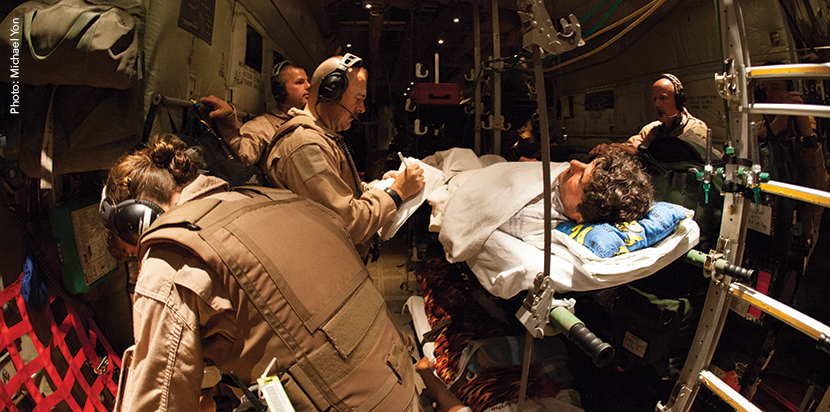Best of CMF Magazine
Aiding the Enemy
Imagine hearing that knock on the door, seeing those uniforms standing on your front step; knowing your nightmares have come to life, and all your tomorrows are about to change. Then you learn your family somehow won the game of chance. The uniforms tell you your soldier is alive, but disabled. You fall to your knees and rejoice, not knowing your military family is in for the battle of your lives – a battle for recognition and compensation benefits.
The Equitas Disabled Soldiers Funding Society was formed in 2011, by a group of concerned Canadians. Their mission is to raise awareness about the problem of reduced disability benefits provided to disabled Canadian soldiers as a result of the 2006 New Veterans Charter – with the hope the public and the Government of Canada will fix the problem. Secondly, the Equitas Society would like to raise the funds necessary to pay for the legal disbursement costs of the disabled soldiers who have retained the law firm, Miller Thomson, to address their reduced disability benefits in the courts.
The President of Equitas Disabled Soldiers Funding Society is Jim Scott, whose son was severely injured in Afghanistan in 2010. “We are essentially a group of parents who recognize that someone has to advocate for these injured soldiers while they are still young. By the time they reach the age of 65 no one will even remember them,” says Scott.
Simply put, disabled soldiers are given a lump sum payout from the Canadian government as per the New Veterans Charter (Canadian Forces Members and Veterans Re-establishment and Compensation Act that replaced the Pension Act) adopted unanimously in the House of Commons, and received Royal Assent on Friday, May 13, 2005. Its provisions came into effect on April 1, 2006.
“This lump sum payout should at least be equal to what a person would get in a car accident settlement, or monthly compensation should equal an average Workman’s Compensation monthly benefit,” says Scott. “It is not. Soldiers should have legal rights at least equal to the Workman’s Compensation or court settlements of the average Canadian. There is a terrible injustice in the way disabled veterans are compensated.”
What does this mean for your military family?
Prior to 2006, the Pension Act was a statute that allowed military members suffering from any service-related injury or disease, a monthly pension for life. The New Veterans Charter replaced, in many cases, a life-long pension for disabled Canadian soldiers with a one-time lump sum payment and other minimum income support benefits that came into effect with Bill C-55. The result is potentially no lifelong disability pension.
A 2011 Queen’s University study found severely disabled Canadian soldiers will only receive approximately two thirds of the disability compensation under the New Veterans Charter compared to the previous Pension Act, focusing only on veterans with severe disabilities—those with a disability assessment of 78 percent or greater. Even more troubling, the study found that the most disadvantaged are those soldiers who are partially or moderately disabled. They receive only 10% of what other traditional compensation programs would provide.
Initially, for the average military family, that lump sum money may pay off credit card bills, a car loan, and put a wheelchair ramp on their home. However, over time it quickly becomes apparent that the lump sum was a mere band aid. Soon tough financial decisions have to be made. There is a good chance the disabled veteran’s financial capacity to earn money will be affected by the disability. What if the member, injured after 2006, is never able to be a financially contributing member of the family again? There is no long term compensation benefit for them; no cheque that arrives in the mail every month, and no easy answers.
“This is moving beyond the tolerance of the average Canadian,” says Scott. “Our soldiers have become disposable. You go to war and you get a lump sum for your efforts that won’t even buy a decent car, and there are thousands of soldiers who don’t even qualify.”
Too often the money to support a disabled soldier’s family comes from community groups, parents, spouses, children and strangers, if it comes at all. Disabled veterans, who did nothing more than the jobs they were paid to do by their employer, the Government of Canada, are being left to live in poverty and disgrace. Scott says a long-term solution must be found, and quickly; with the best interest of these courageous men and women at the heart of the solution.
The Department of National Defence, a separate government department, has no say in this issue. When a country goes to war the military builds a battle plan. They actually plan that humans will be injured or die. They hope the government programs will be there to support families and the injured when the soldiers come home – no matter what the circumstances. “The military does its best to employ the injured, and care for them,” says Scott. “The military looks after its own. It’s when soldiers come back and face the bureaucracy of Veteran’s Affairs it all falls apart.”
Since 2006 there has been a lack of clarity and no lack of administrative red tape keeping disabled veterans from receiving compensation benefits; including federal and provincial jurisdictional arguments. While Veterans Affairs Canada, which oversees the disability settlements, watches the ball being passed back and forth, who’s taking responsibility for our injured soldiers and their families?
The civilian community might ask why disabled soldiers aren’t taking the whole problem directly to a lawyer. Military members and their families are aware there is no such thing as ‘suing the government’ for them. The Crown Liability & Proceedings Act prevents soldiers from challenging their level of compensation benefits, essentially leaving them powerless to change their circumstances.
However, all is not lost. The law firm Miller Thomson has agreed to represent, pro bono, disabled soldiers with settlements under the New Veterans Charter. The Equitas Society has signed an agreement with Miller Thomson requiring Equitas to provide all the legal action disbursement costs – estimated initially at $100,000. “Interestingly, if Miller Thompson is unsuccessful, the Government of Canada will have won its case on the grounds soldiers have limited legal rights and value. At that point there is a chance Equitas Society will face having to reimburse the legal bills of the Crown,” says Scott.
There has been a long standing tradition in Canada that the government will take care of its soldiers be they dead or alive. Miller Thompson is representing the sick soldiers based on the Charter of Rights and Freedoms. On October 30, 2012 Miller Thomson went to the BC Supreme Court to file a Class Action Law Suit on behalf of disabled soldiers who have received low settlements under the New Veterans Charter.
“The government has a fiduciary duty to take care of them; therefore, the soldiers should be protected by the Charter of Rights and Freedoms. The enemy wins when Canadian soldiers are wounded and not cared for. It’s as simple as that. The enemy wins.”
To learn more about the Equitas Society, or to learn how to support their cause visit: http://equitassociety.ca
To see the complete Queens University study please visit:
http://www.queensu.ca/dms/publications/claxton/Claxton13.pdf










